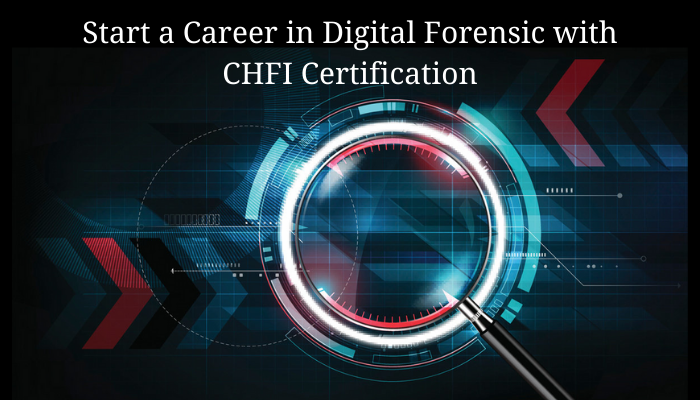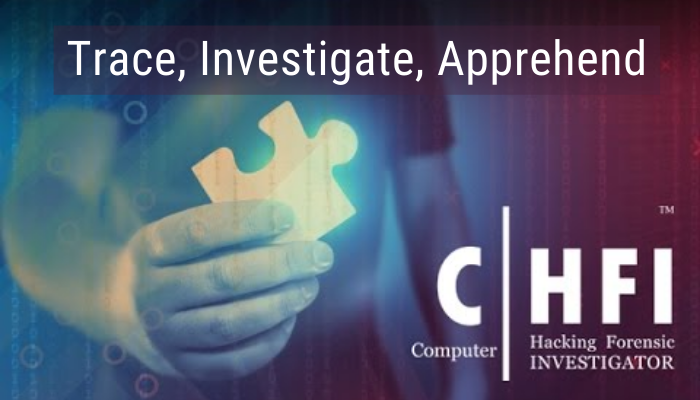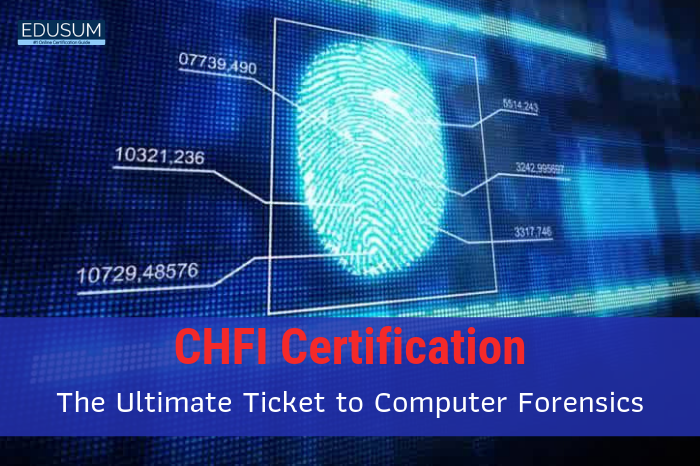The breath-taking pace of cybercrimes and all the more startling number of financial fatalities undergone by organizations has set off a desperate requirement for forensic investigators in the world. Organizations with a proactive approach seeking to hire people who can assist them in identifying, investigate, understand, and retrieve from cyber attacks. The CHFI certification qualifies professionals in the art and science of computer forensics to help them resolve cyber crimes and submit evidence that is legal in a court of law.
The Computer Hacker and Forensic Investigator certification qualify candidates for industry specified fields in computer forensics and cybercrime investigation. CHFI certification equips candidates with high-level knowledge and skills to encounter major forensic investigation scenarios allowing acquirement of practical experience on different forensic investigations.

Applicants acquire practical experience with the standard tools needed to successfully execute a computer hacking forensic investigation. Applicant acquires the skills which result in successful prosecutions in different types of security incidents like corporate espionage, data breaches, insider threats, and other complex cases concerning computer systems.
Why Should You Become a CHFI – Computer Hacking Forensic Investigator?
Cybersecurity is competently expected to become a many billions industry in the years to come. And we are already in the middle of encountering the digital thunder. From the small works to huge projects, everything is happening online. Public, as well as private companies, are reliant on the digital world to manage their business. Whole economics are moving digital in this era. And, as in any physical society, the incidence of crime in the pragmatic society also grows with the rise in its population. For this reason, a child’s game to guess that an increased number of forensic investigators are needed with each day passes, due to which many professionals are looking for a CHFI certification.
Benefits of CHFI Certification
- You will be able to figure out what are the fundamental laws involving cyber forensics.
- You will know how to accumulate evidence with a forensically sound approach.
- You will know how to secure evidence against different threats and submit evidence acceptable by the court of law.
- Learn how to retrieve deleted files and deleted partitions in Mac OS X, Windows, and Linux
- Password cracking tools, concepts, kind of password attacks, and how to examine password-protected file violations.
- You will learn to investigate logs, wireless attacks, network traffic, and web attacks.
- You will know how to trace e-mails and investigate e-mail crimes and much more.
- You will have an understanding of how to execute the forensic tools in different platforms.
Target Audience:
- Defense and Military personnel
- Police and other law enforcement personnel
- E-Business Security professionals
- Systems administrators
- Banking, Insurance and other professionals
- Legal professionals
- Government agencies
- IT managers
What Does a Computer Hacking Forensic Investigator Do?
Being a computer hacking forensic investigator, you will help organizations to carry out a comprehensive investigation into the cyber-attacks they meet and help them trace the crime back to the cybercriminal. Besides this, you will be qualified to do two of the most remarkable things post a cyber-attack, retrieving lost data, and developing reports to present evidence in the court of law that will bring the perpetrators to justice. Needless to say, a computer forensics investigator is a highly esteemed professional in the digital world we are living in today.
Key Roles of Computer Hacking Forensic Investigator (CHFI): Briefly Explained
In the event of cybercrime, digital evidence has an important role in executing forensic investigations that requires CHFI certification that can help you establish techniques to track hackers, detect the source of the attack, retrieve robbed data, and much more. The core roles of a CHFI certified professional comprise:
Investigating Network Intrusions:
With the proficient skill to practice digital forensics investigation tools and techniques, CHFI professionals benefit organizations in investigating networks. They check networks to the core to detect hacking and theft efforts started and implemented over the network. CHFI certification can assist the forensic analysts and investigators in practicing and deploying network monitoring tools and deep packet inspection (DPI) to identify network intrusions and set up organizations to prevent the equivalent cases of a data breach and other cybercrimes into the future.
Recovering and Examining Data:
A CHFI helps you in taking back and recovering the stolen data. The certified CHFI is a master in implementing data recovery tools and approaches to retrieve deleted files and partitions made in different computing environments like Linux, Windows, and Mac OS. In case they find any impaired equipment, they take apart and rebuild the system and retrieve the stolen data. They investigate the retrieved data to identify legal evidence to the cybercrime and intrusive occurrences.
Preventing Data Breaches:
A computer hacking forensic investigator is responsible for performing periodic risk assessments, plan and regulate incident analysis, outline the inference, and discover the correlation between the events to avoid data breach attacks. A CHFI certification demonstrates your skills to inspect the data breach occurrences thoroughly and make essential IT infrastructure modifications to give a secure environment.
Legal Verification:
A professional having CHFI certification greatly helps in carrying out legal verifications to meet the case with the digital evidence in case of cybercrime. The legal verification demands them to carry out an in-depth analysis and research on the digital device employed in the cybercrime, cease it first, check for the usage history, retrieve deleted files, conclude from the network logs and investigate the image files.
Reporting: A CHFI professional collects not only evidence but also files and keeps a record, to successfully meet the legal requirements for continuing a cybercrime case. The role involves preparing and managing case files, reports and computer evidence, network logs, event logs.




